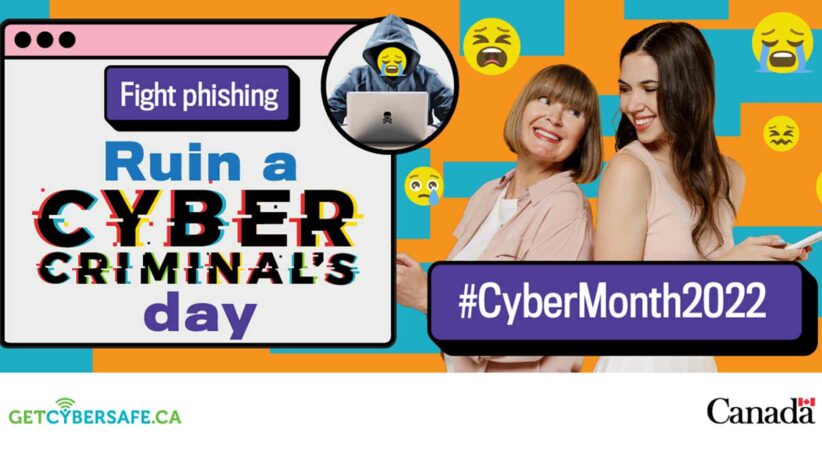
Cyber Security Awareness Month 2022
October is Cyber Security Awareness Month (#CyberMonth2022) and this year’s theme is “Fight phishing: Ruin a cyber criminal’s day!” Read below to learn more about this year’s theme and great resources to support it.
What is phishing?
“Phishing is an attack where a scammer calls you, texts or emails you, or uses social media to trick you into clicking a malicious link, downloading malware, or sharing sensitive information. Phishing attempts are often generic mass messages, but the message appears to be legitimate and from a trusted source (e.g. from a bank, courier company).” – Canadian Centre for Cyber Security
Phishing is one of the most commonly reported frauds in Canada. Two common forms of phishing are “smishing” and “spear phishing.”
- Smishing: Fraudulent text messages designed to induce users to reveal personal or financial information via the mobile phone.
- Spear phishing: Spoof emails to persuade people within an organization to reveal their usernames or passwords. Spear phishing is small-scale and well targeted.
What can you do?
- Check out the free resources in the Government of Canada’s Champions toolkit.
- Take the Canadian Bankers Association’s Cyber Security Awareness Quiz to test your knowledge of the latest phishing scams and tactics.
- Participate in the BC Government’s cyber security challenges.
- Don’t click on links from unsolicited messages.
- Don’t download attachments from unsolicited messages.
- Watch for spelling mistakes.
- Don’t trust a message just because the email address looks legitimate; fraudsters can spoof the address.
- Beware of messages claiming to be from the Government of Canada or a law enforcement agency; they will never contact you to offer funds via email or e-transfer.
The Communications Security Establishment is also back with another catchy and educational Cyber Security Awareness Month video, this time as a sea shanty!
To learn more about phishing and how to avoid being caught in a phishing scam, check out the resources below.
Resources
- Canadian Anti-Fraud Centre: Phishing
- Canadian Consumer Handbook: Phishing
- Communications Security Establishment’s YouTube channel with more helpful phishing videos
- Don’t take the bait: Recognize and avoid phishing attacks
- Get Cyber Safe resources
- National Cybersecurity Alliance (US): Phishing
Related Blog Posts
Text Messages and Literacy
Does text messaging affect literacy? This question is still debated. Read about current research and using texting to teach literacy.
Break the Fake
Today is the start of Media Literacy Week. From October 7th to 11th, Canadians are invited to Break the Fake by stopping the spread of false information. MediaSmarts has brought …
Digital Citizen Day
October 26 is the first Digital Citizen Day! Learn the importance of digital citizenship.
